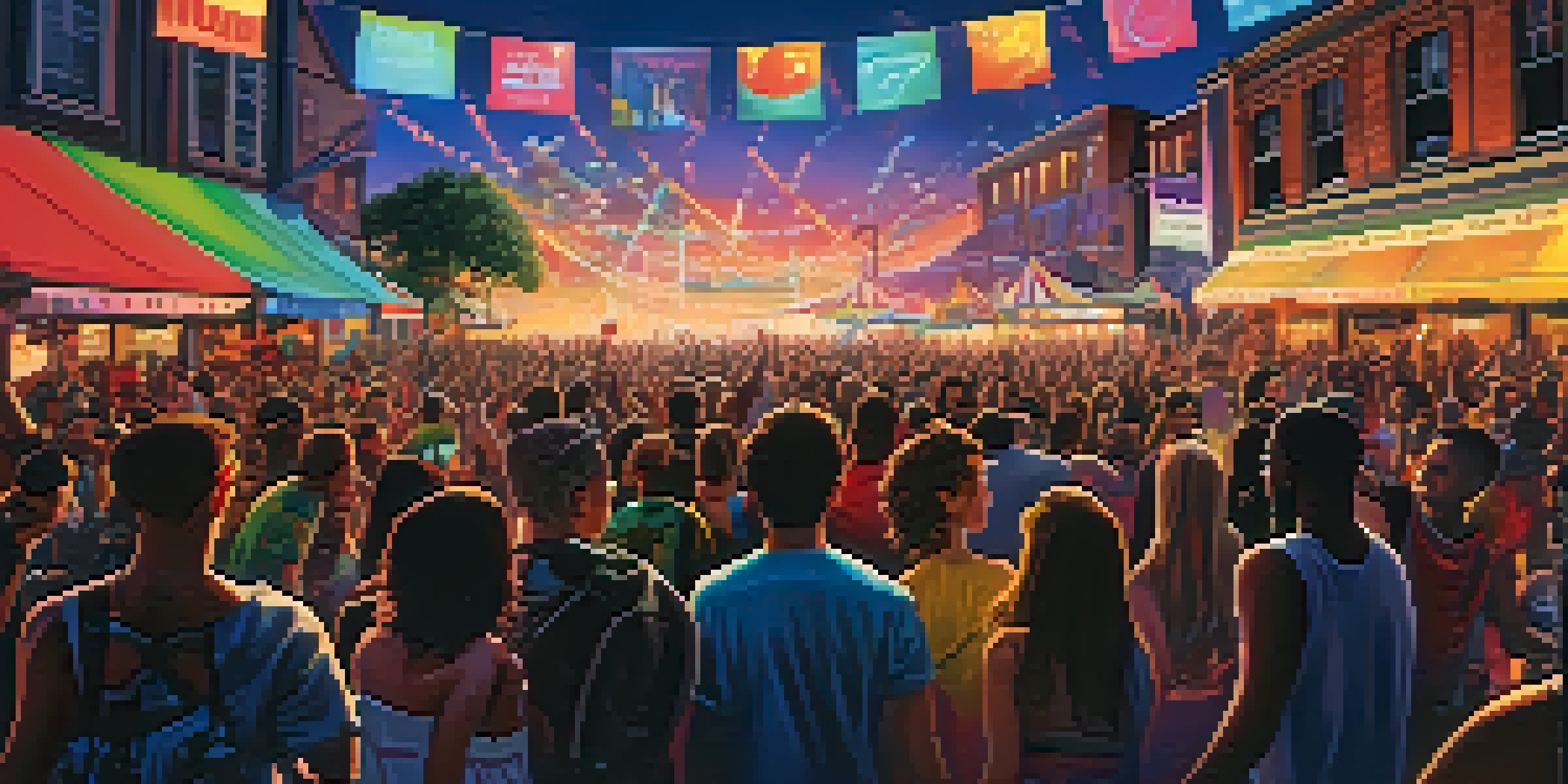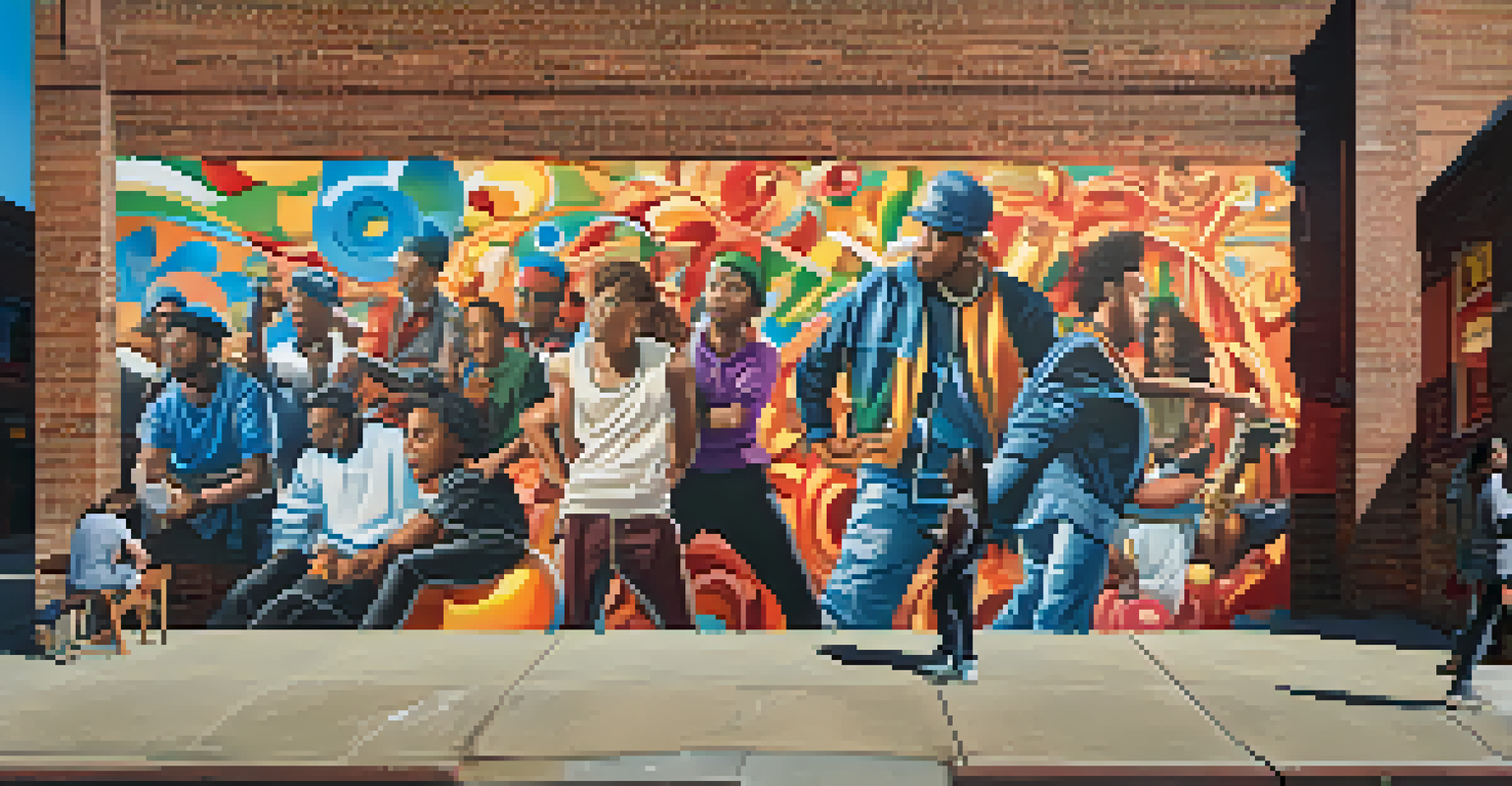The Influence of Genre on Personal and Cultural Identity

Understanding Genre's Role in Identity Formation
Genres are more than just categories of art; they shape our identities. From music to literature, the genres we gravitate towards can reflect our values, beliefs, and experiences. For instance, someone who loves punk rock may identify with the rebellious spirit of the genre, while a fan of classical music might connect with tradition and sophistication.
Music is the shorthand of emotion.
Our personal experiences often dictate the genres we embrace. If someone grew up in a household that celebrated country music, they might find comfort and familiarity in those tunes. This connection to genre can foster a sense of belonging, making it a significant part of our self-image.
Moreover, genres can evolve, just like our identities. As we grow and experience new things, the genres we connect with can change, illustrating the dynamic nature of both personal and cultural identity.
Cultural Identity and Genre Preferences
Cultural identity is deeply intertwined with the genres we enjoy. Different genres often reflect the histories, values, and struggles of specific communities. For example, hip-hop emerged from the African American experience, serving as a voice for social issues and cultural pride.

When we engage with a particular genre, we often connect with the cultural narratives it represents. This connection can foster a sense of pride in one's heritage and encourage individuals to explore their roots. For example, someone who listens to traditional Irish folk music may feel a strong connection to their Irish ancestry.
Genres Shape Our Identities
The genres we connect with reflect our values, beliefs, and personal experiences, influencing our self-image.
Furthermore, the blending of genres can lead to rich cultural exchanges. As different cultures interact, new genres emerge, reflecting a fusion of identities, such as Reggaeton, which combines Latin rhythms with hip-hop and dancehall influences.
The Impact of Genre on Social Interaction
Genres can serve as social glue, bringing people together. Whether it's a shared love for a particular film genre or a music festival dedicated to a specific style, these common interests can spark friendships and strengthen community bonds. For instance, fans of a particular band often form tight-knit groups, sharing experiences and creating lasting memories.
Art is the most beautiful of all lies.
Moreover, social media has amplified the role of genre in social interactions. Online communities dedicated to specific genres allow fans to connect, share ideas, and celebrate their passion. This digital landscape enables people to find their tribe, irrespective of geographical barriers.
However, it's important to acknowledge that genre can also create divisions. People might feel alienated if they don't share the same preferences, leading to an 'us vs. them' mentality. Striking a balance between celebrating our preferences while remaining open to others is crucial.
Genre as a Reflection of Societal Issues
Genres often reflect societal issues, acting as a mirror to the world around us. For instance, dystopian novels and films frequently explore themes of oppression, technology's impact on society, and environmental concerns. These narratives resonate with audiences who may feel disillusioned by current events.
Additionally, genres can provide a platform for marginalized voices. By showcasing stories and experiences that are often overlooked, genres like LGBTQ+ cinema or feminist literature can challenge societal norms and promote empathy. This representation is vital for fostering understanding and acceptance.
Cultural Identity and Genres
Genres often represent the histories and struggles of specific communities, fostering a sense of pride and belonging.
As societal issues evolve, so too do the genres that address them. This adaptability allows genres to remain relevant, ensuring that they continue to speak to the experiences of new generations.
The Role of Genre in Personal Growth
Engaging with different genres can facilitate personal growth. Exposure to diverse stories, music, and art can broaden our perspectives and challenge our preconceptions. For example, someone who typically enjoys romantic comedies might discover profound insights in a thought-provoking documentary.
Genres can also inspire individuals to explore new aspects of themselves. A person who discovers a passion for heavy metal may find a newfound sense of confidence and self-expression, breaking free from societal expectations. This exploration can be liberating and transformative.
Ultimately, the genres we consume can shape our emotional landscapes. They can evoke nostalgia, provoke thought, or even inspire action, illustrating their significant role in our personal journeys.
The Evolution of Genre and Identity Over Time
Genres are not static; they evolve alongside our identities and cultural landscapes. As society changes, so do the themes and styles that resonate with audiences. For instance, the rise of streaming services has changed how we consume and categorize genres, allowing for more hybrid forms that reflect our diverse tastes.
This evolution can lead to a re-examination of identity. As genres blend and change, individuals may find themselves drawn to new influences that reshape their understanding of self. A once-exclusive genre may become more inclusive, inviting new voices and perspectives.
Genres Reflect Societal Issues
Genres serve as a mirror to societal concerns, providing platforms for marginalized voices and challenging norms.
In this sense, the evolution of genre mirrors our own growth. Just as we learn and adapt over time, genres too transform, highlighting the fluidity of identity in a constantly changing world.
Conclusion: Embracing the Power of Genre
In conclusion, the influence of genre on personal and cultural identity is profound. Genres shape our experiences, connect us with others, and reflect the complexities of society. By understanding this relationship, we can appreciate the richness that genres bring to our lives.
It's essential to embrace the diversity of genres and the stories they tell. Each genre offers a unique lens through which we can explore different aspects of ourselves and the world around us. Celebrating these differences can lead to greater empathy and understanding.

Ultimately, our engagement with genre can enhance our identities, allowing us to navigate the intricate tapestry of culture and self-expression. So, let's continue exploring, connecting, and growing through the genres we love.